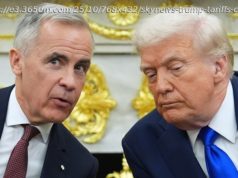The controversial case raises bioethical issues and caught the attention of President Trump and Pope Francis.
LONDON — A British court decided Monday to give the parents of 11-month-old Charlie Gard 48 hours to present new evidence to prove that the terminally ill baby should receive experimental treatment in the United States or another country.
Judge Nicholas Francis of Britain’s High Court gave the couple until Wednesday afternoon to turnover medical evidence that they claim has a chance of improving, although not curing, Charlie’s condition. If Chis Gard, 32, and Connie Yates, 31, do so then Monday’s hearing will resume Thursday.
Charlie suffers from a rare condition called mitochondrial depletion syndrome that has caused brain damage and left him unable to move. He can only breathe with a ventilator.
Great Ormond Street Hospital, which has cared for Charlie since October, was scheduled to turn off the baby’s life support systems on June 30 because his British doctors concluded that an experimental treatment proposed by a neurologist in the U. S. would not ease his suffering or improve his condition.
But that move is against his parents’ wishes and in Britain it is the courts, not the family, who decide how to proceed if there is a medical dispute.
The hospital applied for the new court hearing because the parents said there was new evidence from Italian researchers at the Vatican’s children’s hospital and another facility outside of Britain showing the experimental therapy was worth pursuing.
A lawyer for the family argued in Monday’s hearing that the new evidence suggested that the treatment could lead to a « clinical improvement, » although an attorney acting for Great Ormond Street Hospital challenged whether the evidence was really new.
« What I think a lot of people can’t get their head around is that we are not allowed to take our son from one hospital to another one to possibly save his life, » the boy’s father, said in an interview with USA TODAY on Sunday.
« It’s not just that we think we know best, » added Charlie’s mother. « There are other doctors in America and around the world now who think it is worth a chance. While Charlie’s still fighting, we are still fighting. »
The couple spoke to USA TODAY shortly after delivering a petition with 350,000 signatures to Great Ormond Street Hospital calling on doctors to allow him to seek the treatment abroad. They vowed to « let Charlie go » if it did not work in a short time.
Chris Gard described the outpouring of international support for his son as « amazing » and said it was « keeping them going. » He said the couple aren’t particularly strong people, but « what is strong is our love for that little boy. »
Charlie is blind and deaf and has frequent seizures.
« We have a different perspective, or at least emphasis, on things like autonomy and the proper role of parents in decision-making for their children, » said G. Kevin Donovan, an expert on bio-medical ethics and a professor at Georgetown University Medical School in Washington, D. C.
« Physicians in the U. S. would argue that even though little Charlie has a grim prognosis, there might some hope or benefit by intervening with experimental therapy, » Donovan said.
A U. S.-based neurologist, identified in legal documents only as Dr. I because of court restrictions, is willing to try an experimental treatment that he admits is unlikely to work on Charlie and has not been tested — even on animals.
But several court rulings have prevented the parents from taking up the offer because the boy’s British doctors don’t think the therapy would improve his quality of life and could even cause him further pain.
However, the parents think it is a risk worth taking and have raised more than $1.6 million to have Charlie treated in the U. S. or another country.
Britain’s High Court ruled in April that Charlie’s doctors agreed that the child should be taken off life support systems and given « palliative care only and that he should be allowed to die peacefully and with dignity. »
In his ruling, Justice Francis cited testimony from Dr. I, who conceded that Charlie is unlikely to improve with the experimental therapy, but he would still treat the boy.
Charlie’s case was thrust into the global spotlight when Trump tweeted that if the U. S. could help, « we would be delighted to do so. » And the pope said the Vatican’s hospital was also willing to take the boy. Pope Francis said he hoped Charlie’s parents would be allowed to « care for their child until the end. »
U. S. Reps. Brad Wenstrup, R-Ohio, and Trent Franks, R-Ariz., said they will introduce a bill this week in the House of Representatives, calling for Charlie and his parents to be given U. S. residence status so their son can receive treatment.






